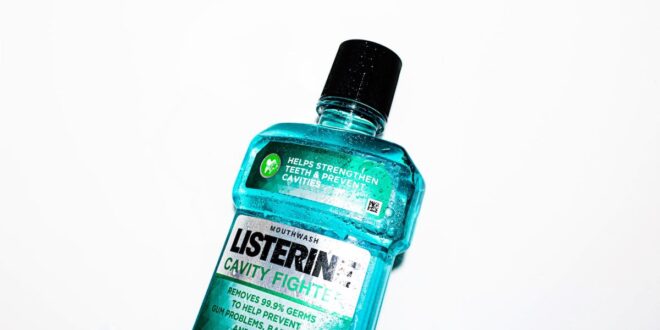Most of us would have grown up gargling mouthwash such as Listerine in the morning and before bed. Most of us would remember how much they can burn as well, although we tend to brush it aside, telling ourselves that the burning sensation is good. However, have you ever wondered why Listerine burns?
Listerine may burn your mouth because of the alcohol and menthol content. Some Listerine formulas also contain hydrogen peroxide, chlorhexidine, or essential oils such as peppermint, eucalyptus, and thyme oil that may irritate your mouth.
This article explores Listerine, the ingredient used to make them, and why it burns. We also explore other possible reasons why your mouth burns when using Listerine and if there are non-burning mouthwashes.
Finally, we look at if there are any natural substitutes for mouthwash if you prefer to go natural.
What Is Listerine?
Listening is the first antiseptic mouthwash sold over the counter in the US in 1914. It was named after Joseph Lister, a surgeon who pioneered antiseptic surgery in Scotland. Listerine was originally developed as a general antiseptic but was successful as a mouthwash formula.
Listerine is a brand of antiseptic mouthwash. The name Listerine came from Joseph Lister, who pioneered antiseptic surgery at the Glasgow Royal Infirmary in Scotland. You may also see Listerine being used on products such as toothpaste, chewable tablets, and dental whitening strips.
The creation of Listerine could be traced back to Louis Pasteur, who proposed the germ theory in 1861. The theory proposes that microorganisms and bacteria cause diseases and infections.
Inspired by the findings, Joseph Lister demonstrated that the rate of infection drops by using carbolic acid on surgery dressings. This further inspired a doctor far away in St. Joseph, Missouri, to develop a surgical antiseptic using eucalyptol, menthol, methyl salicylate, and thymol. This antiseptic formula was named ‘Listerine’ in honor of Lister.
Listerine was eventually licensed to be manufactured by Lambert Pharmacal Company, who tried to market Listerine in many ways. They distilled the formula to strengthen it and sold it as a floor cleaner and a cure for gonorrhea.
However, when Lambert promoted it to dentists for oral care in 1895, Listerine took off. It eventually became the first over-the-counter mouthwash in the US in 1914, and revenue rose from $115,000 to over $8 million.
Listerine is currently made by Johnson & Johnson. He acquired the license after it had exchanged hands many times over the years. Aside from its original formula, Listerine is now available in nine different flavors:
- Original
- Cool Mint
- FreshBurst
- Natural Citrus
- Naturals
- Soft Mint
- UltraClean
- Tooth Defense
- Whitening Pre-Brush Rinse
What Are The Benefits Of Using Listerine?
Regularly gargling your mouth with Listerine helps to improve your oral hygiene. Better oral hygiene, in turn, helps you to fight off gum disease, as well as bad breath. Some flavors of Listerine can also help you improve your teeth’ strength and whiten them.
There are reasons why mouthwash became popular, and billions worldwide gargle mouthwash every day. Mouthwashes such as Listerine provide many benefits, which can help to improve your oral and dental hygiene.
Mouthwash Fights Gum Disease
Gum diseases such as gingivitis and periodontitis usually result from poor oral hygiene or improper brushing technique. Many, when brushing teeth, seem to focus on the teeth but not on the gum pocket, where the gums meet the teeth. It is usually in this area that gum disease starts.
Gargling with Listerine once or twice a day helps to address some poor brushing techniques. It may at least help to clean up the gum pocket area missed during brushing and prevent gum disease from developing. However, it is not a 100% replacement for proper brushing.
Mouthwash Removes Bad Breath
Bad breath could be caused by many things, but generally, it may be caused by bad bacteria that grow on our tongue, gum, or other parts of the mouth. Bad breath could also be a sign of Halitosis, which is an oral health issue.
Using Listerine daily helps to kill and eliminate germs and bacteria that have developed in the mouth. This helps to remove sources of bad breath directly from your mouth.
Mouthwash Whitens Your Teeth
When you visit your dentist, you may be asked if you want to whiten your teeth. If you say yes, you will usually end up having some hydrogen peroxide gel applied to your teeth, and the solution will help improve your teeth’ color.
Some formulations of Listerine, such as the Listerine Healthy White Vibrant mouthwash, also contain hydrogen peroxide. This means if you gargle with this flavor every day, you may be able to whiten your teeth.
Other mouthwashes may contain other whitening agents, such as coconut oil or activated charcoal.
Mouthwash Strengthens Tooth Enamel
Enamel is the outer shell of your teeth. It is hard and can usually handle tasks such as chewing and all. However, enamel may thin over time due to sugar acid from a sweet diet, poor oral hygiene, etc.
Some mouthwash, such as Listerine’s Total Care, contains fluoride, which may help replenish some of the lost enamel and strengthen your teeth.
What Are The Ingredients In Listerine?
The common ingredients used to make Listerine include alcohol, water, eucalyptol, menthol, thymol, and methyl salicylate. Preservatives and emulsifiers such as sodium benzoate and Poloxamer 407 are also common. Some colorings may differ depending on the Listerine flavor you choose.
Listerine comes in 9 distinct flavors and formulations, which means the ingredients used to make them may differ. However, in many cases, the base formula remains the same. There is alcohol, eucalyptol, thymol, menthol, and methyl salicylate. The difference may be in additional flavoring and colorings used.
If you look at the ingredients list of a bottle of Listerine Original formula, you may see the following:
Water
Water serves as the medium to have all the ingredients mixed together. It also makes Listerine liquid enough to be gargled in the mouth and enter all the gaps between our teeth.
Alcohol
Alcohol primarily helps kill germs and bacteria, as it is a strong antiseptic. This may also serve as a solvent for some of the active ingredients in Listerine, which may not dissolve well in water.
The variant of alcohol used in Listerine is Ethanol, which is similar to drinking alcohol. If you accidentally swallowed some Listerine, it should still be ok.
Eucalyptol
Eucalyptol is known for its powerful anti-inflammatory feature and can be a good topical pain reliever. It is used as Listerine as part of its original formula.
Menthol
Menthol is used in Listerine for its anti-microbial features, which help kill bacteria and stop their growth. This also leaves your mouth with a cool, refreshing feeling similar to mint.
Thymol
Thymol is another effective antiseptic with strong anti-bacterial and anti-fungal abilities. This explains why it exists in Listerine. Thymol is also known to be good for helping with a sore throat and minor mouth inflammation.
Methyl Salicylate
Methyl salicylate is also a common antiseptic, which is why it ended up in Listerine. It is also a mild flavoring agent, capable of giving you a fresh feeling in the mouth after gargling Listerine.
Benzoic Acid
Benzoic acid works as a preservative, preventing any external bacteria or germs from finding their way into your bottle of Listerine. There has been a debate that benzoic acid causes hyperactivity. Still, it exists naturally in fruits such as strawberries and cranberries.
Poloxamer 407
This odd-sounding ingredient is used as a co-emulsifier. It helps Listerine to be able to blend everything together without separating into layers.
Without Poloxamer 407, your Listerine may separate into oil and water layers after sitting on the shelves for a while. It also prevents Listerine from becoming too foamed up when gargled.
Caramel
Caramel in Listerine’s formulation refers to the coloring agents added to the formula. This gives Listerine original its signature brownish-yellow color. Debates about caramel coloring being carcinogenic have also existed for a while, but no concluding results have been proven.
The other Listerine formula may contain different coloring. Some may even have sweeteners added to improve their taste. These sweeteners, such as sucralose, sorbitol, or saccharin, are usually artificial.
There are also non-alcoholic formulations of Listerine. With these formulas, alcohol is substituted with chlorhexidine.
Why Does Listerine Burn?
Listerine may burn because of the alcohol and menthol content. You may also be sensitive to hydrogen peroxide, chlorhexidine, or essential oils such as peppermint, eucalyptus, and thyme oil could burn your mouth.
When they start gargling their mouth with Listerine, some people may feel fine. However, they start to feel the burning sensation after some time, causing them to spit the solution out. Chances are you have the same experience.
The burning sensation is commonly caused by the alcohol or menthol used in Listerine. This is likely due to the alcohol drying out your gums and other parts of the mouth.
You may notice that the burning sensation may be more noticeable on the front of your tongue. This may be likely due to our tongues being more sensitive.
Some people also may have sensitivities to other ingredients used in Listerine, which may also trigger the burning sensation. These ingredients may include hydrogen peroxide and chlorhexidine.
Listerine also uses many derivatives of essential oils, such as peppermint, eucalyptus, thyme, and wintergreen. These may also irritate your mouth, causing a burning sensation.
Some may assume the burning sensation is something good or is a healing crisis. However, this may not be true, as the burning sensation likely is caused by parts of your mouth drying out.
This means you may want to spit your Listerine out of your mouth when you start feeling the sensation. You may also want to consider switching to an alcohol-free mouthwash to see if that reduces the burning sensation.
Are There Other Reasons For Burns When Using Listerine?
Mouth burn from using Listerine could also be caused by other factors, such as mouth ulcer, gum disease, or sensitivity to any of Listerine’s ingredients. Alcohol and menthol may not be the only culprit here.
Many people would automatically lay the burning sensation squarely on Listerine’s alcohol or menthol content. Unfortunately, things are never that simple. Surprisingly, they found that even non-alcohol mouthwash still burns their mouth.
There are factors outside the mouthwash that may cause mouth burns when using Listerine. These may be related to your oral conditions.
Mouth Ulcer
Some of us may end up with mouth ulcers at some point. We may get an ulcer from accidentally biting the inside of our cheek or from a poor diet. If you have a mouth ulcer, it means you have an open wound inside your mouth.
This means when you add alcohol-based mouthwash to it, the ulcer area would burn and sting. Even if you use a non-alcoholic Listerine mouthwash, you will still experience burning and stinging sensations.
Gum Disease
Gum disease such as gingivitis starts when the gum pocket area becomes inflamed. The gum pocket refers to the area where the gum meets the teeth. Inflamed gums usually bleed easily, and may shrink, leaving more teeth exposed.
Untreated gingivitis eventually becomes periodontitis, and your teeth may fall out since little gum is left to support them.
Listerine is effective in preventing or at least controlling gingivitis. It does this by helping to keep germs and clean up your gums. However, as it does this, you may feel pain and a burning sensation since inflamed gum may be more sensitive.
Sensitivity
If you are sensitive to any of Listening’s ingredients, you may also experience some burning sensation. This burning sensation may not be limited to only alcohol or menthol.
You may be sensitive to antiseptics, which are methyl salicylate, thymol, or eucalyptol. You could also be sensitive to one of the additives, such as hydrogen peroxide. The key is to spend some time and experiment with different formulations of mouthwash to see if you show sensitivity to any of these ingredients.
How To Reduce Burning Sensation When Using Listerine?
To reduce the burning sensation when using Listerine, gargle and spit the mouthwash out before the burning sensation comes. You can also dilute it with water. If nothing works, consider switching to alcohol-free Listerine formulas.
Suppose you understand the importance of mouthwash but still somehow find the burning sensitivity somewhat unbearable. In this case, you have some options to try and see if you can reduce the burning sensation.
Gargle and Spit Before Burning Sensation Comes
Some of us do not get the burning sensation immediately when gargling with mouthwash. Instead, it only comes after a bit of time, say after about 30 seconds.
If you are one of these people, consider yourself lucky since your solution to the burning problem is the simplest. Simply spit out the mouthwash before the burning sensation comes.
You can do this by experimenting with how much time it takes before the burning sensation comes, perhaps by using a clock or timer. Then once you have established a time, gargle fast and hard, and spit out the mouthwash before the time elapsed.
Dilute With Water
Another option you can consider is to dilute the mouthwash with water. When you do this, you also dilute the strength of the alcohol and other potential irritants inside the mouthwash.
This may reduce the burning sensation and make using Listerine a more enjoyable experience.
However, if you do this, consider gargling your mouth longer. This is because when the formulation is diluted, it may not work as well. As a result, you may need to give the mouthwash more time to do its job.
Use Alcohol-Free Listerine
Suppose you can confirm that your burning sensation comes from alcohol or menthol. In that case, your logical choice is to migrate to an alcohol-free Listerine.
The good thing about this choice is, you can easily get many flavors of alcohol-free Listerine. They taste surprisingly better, with flavors like lemon, coconut, and lime.
Some of the alcohol-free Listerine formulations include Listerine Zero, Listerine Ultra-Clean Zero, Listening Total-Care Zero, and Listerine Sensitivity.
Are There Natural Substitutes For Listerine?
Suppose you prefer a natural, less formulated mouthwash. In that case, you can use either hydrogen peroxide, apple cider vinegar, baking soda, salt, or peppermint oil. These ingredients can be mixed with water and then used to gargle. Most are also safe to swallow as well, in case that happens.
If you ever wondered if people actually used mouthwash before the invention of Listerine, the answer is yes. The only difference is that the formulation is not as strong, and the ingredients used are natural.
This means you can also do the same and rinse your mouth with natural mouthwash other than Listerine. The best thing about these ingredients is that many are swallow-safe, which means if you accidentally swallowed some, you should be ok.
Apple Cider Vinegar
Apple cider vinegar is a good antiseptic, which means it could help kill off germs and fight issues such as bad breath or Halitosis. However, gargling apple cider vinegar in the mouth may be a little difficult since it’s so sour.
To make it easier, consider diluting it with water. Take one teaspoon of vinegar, and mix it into an eight-ounce cup of water. This should make the mixture easier to gargle and handle.
Baking Soda
Also called sodium bicarbonate, baking soda is one of the most wonderful ingredients we have lying about in our house. It cleans everything, from floors, clothes, and, yes, even your mouth.
If you use it as a mouthwash, you stand to gain from its antiseptic properties, which means it can help kill germs and nasties in your mouth. Take a teaspoon of baking soda, and mix in a glass of distilled water to make your natural mouthwash.
Hydrogen Peroxide
In the dental world, hydrogen peroxide is known for its two major strengths: dental whitening and antiseptic properties. This explains why some teeth-whitening mouthwash uses hydrogen peroxide as well.
You can also benefit from its strength by mixing one part of hydrogen peroxide with two parts of water. This way, you can remove some of the bitter taste and make the solution more liquid to swish around your mouth.
Hydrogen peroxide may not be safe if a large amount is swallowed, so you must be careful and remember to spit out your mouthwash after rinsing.
Peppermint Oil
If you like the refreshing feeling of regular mouthwash, you can use peppermint oil to make your homemade mouthwash. Drip several drops of peppermint oil, and mix it into a cup of water. Rinse your mouth with the mouthwash, and enjoy the fresh, minty breath afterward.
The issue with peppermint oil is that you may have stomach discomfort if too much is swallowed. This means you want to be more careful when using peppermint oil mouthwash.
Salt
If you prefer a more neutral-tasting mouthwash, consider using salt in your homemade mouthwash. This could be done by mixing up one cup of water, one tablespoon of salt, and one and a half teaspoons of baking soda.
Stir and ensure everything is diluted well. You can use warm water to help dilution to happen faster. Once done, rinse your mouth with the solution for 2-3 minutes for the best results. You may find the mouthwash not burning and rather comfortable to gargle with.
What Happens If I Swallowed Listerine?
In small amounts, Listerine is not likely to harm you. Ingesting large amounts of Listerine may cause drunkenness due to the alcohol. Hydrogen peroxide and methyl salicylate may cause stomach problems. Your body may also undergo acid-base balance issues.
We all know that swallowing Listerine is never a good idea. In fact, you may regularly see this being mentioned on Listerine’s product packaging.
However, we may accidentally swallow Listerine while gargling. This can happen due to us being surprised or if we try to talk while having Listerine in our mouths.
If you accidentally swallow Listerine, it generally does not harm you in many ways, especially if the amount is small. Listerine’s formulation does not contain any poison that can harm you. If it does, it would not have passed FDA’s check.
However, larger amounts may cause some issues with your body. The alcohol-based Listerine formulas, if ingested in large amounts, can cause drunkenness, similar to if you have been drinking. This explains why mouthwash may be a popular alternative for poor drinkers to get drunk.
On top of that, some ingredients in Listerine, such as methyl salicylate and hydrogen peroxide, may cause stomach discomfort and problems. Listening is also acidic, meaning if you ingest a large amount of it, it may affect your body’s acid-base balance.
These issues are not exactly life-threatening and may go away on their own after some time. However, if you are unsure, consider visiting your doctor for more personalized advice.
 Being Human
Being Human





